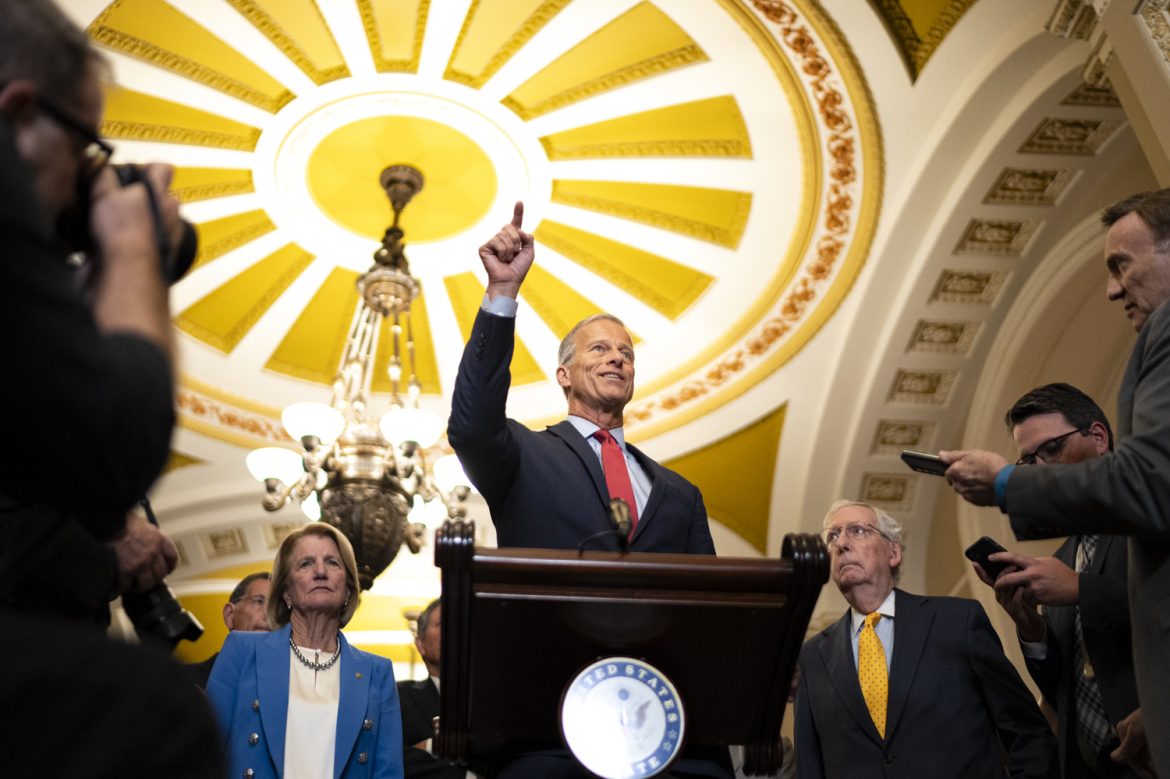
GOP senators brush off concerns about Thune’s relationship with Trump
John Thune triumphed in his campaign for GOP leader by laser-focusing on two things: Republican senators and mending his relationship with Donald Trump.
He spent the last few months donating heavily to colleagues and joining them on their campaigns. He spoke frequently with Trump directly, including after the general election last week. And he ignored a conservative and MAGA-world pressure campaign to elect Sen. Rick Scott (R-Fla.) as the GOP leader.
“I’ve been focused on my colleagues,” Thune said. He narrowly defeated Sen. John Cornyn (R-Texas) on the second ballot by a vote of 29-24. Scott fell on the first ballot.
His ability to navigate his way to victory in this political environment is an early signal of how Thune plans to try to balance leading a historically bipartisan institution and appeasing Trump when Republicans control all branches of the government.
An institutionalist like his predecessor, current Minority Leader Mitch McConnell, Thune has worked to stay in touch with Trump while keeping his focus heavily on the senators who will actually keep him in power. Senators ultimately backing Thune indicates they remain interested in holding tight to their congressional powers, even as they look to greenlight much of Trump’s agenda — many Thune backers cited holding firm to separation of powers as one of their motivations heading into the vote.
Still, it was important to senators that Thune ended his rift with Trump, after a series of public criticisms against the former president. Thune said after the Jan. 6, 2021 Capitol attack that Trump’s actions were “inexcusable.” He was also the first member of congressional GOP leadership to call on Trump to withdraw from the presidential race after the infamous Access Hollywood tape was made public.
But even conservative senators aren’t worried about that history, at least right now.
“J.D. Vance once referred to him as Hitler, and he’s vice president,” Sen. Kevin Cramer (R-N.D.) told POLITICO of Thune’s past criticism of Trump. “So, one thing I know about Donald Trump: he’s got that sort of jocular, masculine ability to let the past be the past and embrace and pray in the middle of the 50-yard line after the game.”
Cramer, a Thune backer, called Trump “not an irrelevant factor, but not the main factor” for most senators’ votes on the leadership slate.
“They’re in a good place with each other,” added Sen. Markwayne Mullin (R-Okla.), who’s spent recent time with Trump and is a Thune ally. “There’s no rift between them. There are no concerns about their relationship at all.”
Still, there are major potential areas of disagreement looming over the next two years, particularly the fate of the Senate filibuster. The president-elect has at times called to abolish the 60-vote threshold, including pushing hard on then-Majority Leader McConnell during Trump’s first term in the White House, while Thune has publicly confirmed he plans to keep the current threshold in place.
And there are still moderates in the chamber who could be a thorn in Thune’s side on nominees or other conservative priorities. GOP Sens. Lisa Murkowski (Alaska) and Susan Collins (Maine) have been vocally outspoken against the president at times. Sen. Bill Cassidy (R-La.), who voted to convict Trump in his second impeachment trial, is still in the chamber.
Trump, in Washington for meetings with the House Republican conference and President Joe Biden, did not immediately comment following the approval of the new Senate GOP leadership slate. But Thune and Trump have spoken regularly over the past few months, including a phone call after Thune won on Wednesday.
“[Thune] said over and over and over and over that he was going to make President Trump’s agenda his agenda, and so I feel good about that,” prominent conservative Sen. Josh Hawley (R-Mo.), who supported Cornyn, said after the vote.
Multiple senators pointed out that Thune’s voting record aligned with Trump’s more than 90 percent of the time during the president-elect’s first term in office, according to a FiveThirtyEight average, a point that was underscored during a candidate forum Tuesday and during nomination speeches Wednesday.
“President Trump and Sen. Thune I think will do a great job working together,” said Sen. Katie Britt (R-Ala.). “Sen. Thune is ready for change, and he knows that America is expecting results.”
That voting record is not reflective of some of Thune’s prior dust-ups with Trump, though. In addition to comments on Jan. 6 and the Access Hollywood tapes, Thune more recently backed Sen. Tim Scott (R-S.C.) initially in the 2024 Republican primary before shifting to Trump after the South Carolinian withdrew from the race. Trump even sought to recruit a primary challenger against Thune for his 2022 reelection bid, but was ultimately unsuccessful.
Despite that history and their losses, Cornyn and Scott both expressed support for Thune’s leadership and vowed Republicans would stick together to enact their agenda.
“There’s no division,” Cornyn insisted. “I think it’s really important for our conference to stay together, to be as effective as we can be. … It was a secret ballot so, I don’t think any of us know exactly who voted for who.”
That dynamic is something Thune tacitly acknowledged after the vote, vowing to “be a leader who serves the entire Republican conference.”
“This Republican team is united. We are on one team,” Thune said. “We have a mandate from the American people.”
Eleanor Mueller, Meredith Lee Hill and Caitlin Emma contributed to this report.
